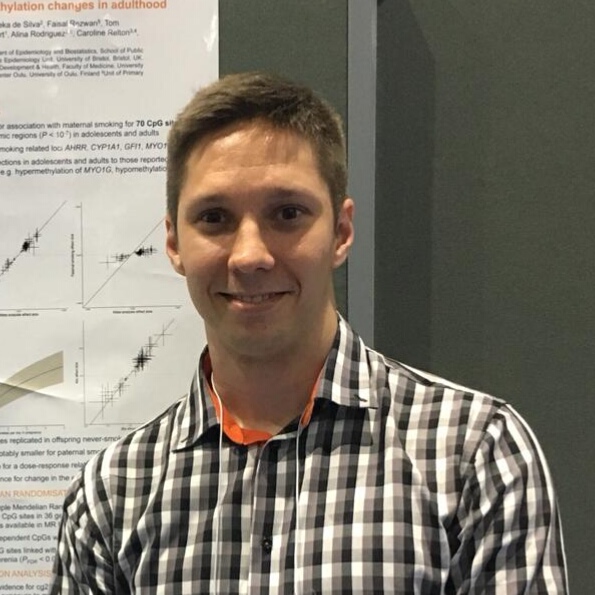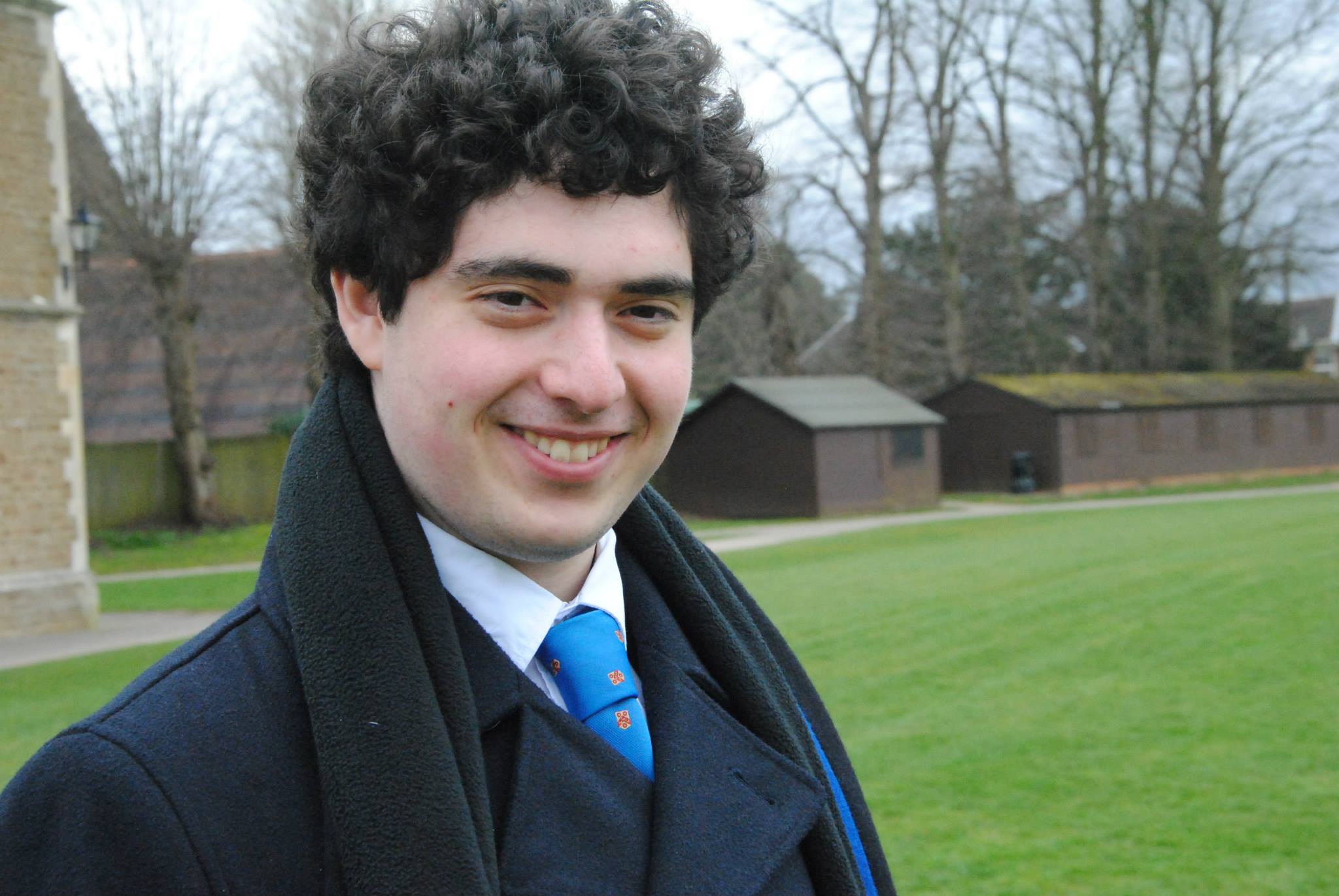 |
The Burgess Research GroupStephen Burgess, Group leader: Stephen completed his BA and MMath (Part III) in Mathematics at the University of Cambridge. He studied for a PhD in the MRC Biostatistics Unit, Cambridge, from 2008-11 working on methods for Mendelian randomization analysis under the supervision of Simon Thompson. He joined the Cardiovascular Epidemiology Unit in the Department of Public Health and Primary Care of the University of Cambridge in 2011. In 2013, Stephen was awarded a Wellcome Trust entry-level fellowship (Sir Henry Wellcome Post-doctoral Fellowship) to continue theoretical and applied work in the field of Mendelian randomization. In 2017, he moved to the MRC Biostatistics Unit on a Wellcome Trust/Royal Society intermediate fellowship (Sir Henry Dale Fellowship) to establish a research group in the MRC Biostatistics Unit, where he is now a Programme Leader. In 2023, he was given a Career Development Award by the Wellcome Trust to continue work in this area. He leads a small team of researchers split between the MRC Biostatistics Unit and the Cardiovascular Epidemiology Unit. He is always open to requests for collaboration, either on theoretical or applied Mendelian randomization projects. Stephen also has a part-time role at Sequoia Genetics, as their Director of Statistics. |
|
|
Amy Mason: Amy is a research associate in the CEU (Cardiovascular Epidemiology Unit) at the University of Cambridge. She uses the statistical methods developed by this group and the UK Biobank dataset to answer causal questions about heart disease and other illnesses. Amy's current work plans include coding R packages for easier investigations of non-linear causal associations, and investigating the evidence for traditional risk factors of acute coronary disease in non-White European populations. SUMnlmr, an R package that facilitates flexible and reproducible non-linear Mendelian randomisation analyses | Link |
|
|
Ashish Patel: Ash is a research associate working on methods to tackle unobserved confounding, selection bias, and general causal inference problems encountered in biostatistics. He is also interested how to make honest inferences after data-driven model selection. He completed his PhD in Economics at the University of Cambridge, where his research centred on improving inference in models that are described by moment restrictions, with a particular focus on empirical likelihood and missing data. Selection of invalid instruments can improve estimation in Mendelian randomization | Link |
 |
Ville Karhunen: Ville is a senior research associate at the MRC Biostatistics Unit. Ville's background is in statistics, and he has completed a PhD in statistical and molecular epidemiology. His main research interests are causal inference and high-dimensional data-analysis, and their applications in molecular epidemiology. |
 |
Ang Zhou: Ang is a research associate at the MRC Biostatistics Unit. Before joining Stephen's group, his research focused on utilizing genetic data to understand the causal relationships between nutritional and modifiable lifestyle factors, and health outcomes, particularly in cognitive and cardiometabolic functions. In his current role, Ang is transitioning his research towards methods development, with a focus on instrument selection for the cis-Mendelian randomization analysis. |
 |
Janne Pott: Janne is a research associate with a background in Genetic Epidemiology and sex-stratified genetic analyses. She is particularly interested in gene-sex-interactions in dimorphic traits and how that translate into causality on complex diseases. Her current work she focuses on steroid hormones and lipids to identify tissue-dependent causal effects using multivariate MR. |
 |
Benjamin Woolf: Benji is currently a part time PhD student in Genetic Epidemiology at the at University of Bristol and a part time Research Assistant at the MRC Biostatistics Unit. He is interested in most things to do with Mendelian randomisation, especially novel applications such as to second-hand smoking and new drug targets. MVMRmode: Introducing an R package for plurality valid estimators for multivariable Mendelian randomisation | Link |
| James Lane: James is a PhD student who joined the group in October 2023. Before taking up his PhD, James visited the group as part of a summer intern project in 2022, supervised by Ashish Patel. | |
 |
Nasir Bashir: Nasir joined the group as a PhD student in October 2024, under a fellowship from the Wellcome Trust. His research centres around the development and application of methods to make inference from large-scale data. Nasir originally trained as a dentist at the University of Birmingham, followed by clinical academic posts at the University of Bristol, University of Leeds, and general practice. He then retrained in mathematics, obtaining an MSc in Statistics from the University of Sheffield. |
|
Long running guests |
|
 |
Andrew Grant: Andrew was a research associate in the MRC Biostatistics Unit at the University of Cambridge between 2018 and 2022, now working as a lecturer at the University of Sydney. Andrew J. Grant - Google Scholar Pleiotropy robust methods for multivariable Mendelian randomization | Link Noise-augmented directional clustering of genetic association data identifies distinct mechanisms underlying obesity. | Link |
 |
Apostolos Gkatzionis: Apostolos was a post-doctoral researcher at the MRC Biostatistics Unit in Cambridge between 2017 and 2020, and is now working as a Senior Research Associate at the MRC Integrative Epidemiology Unit in Bristol. He is a statistician by training, with a particular interest in causal inference and genetic epidemiology. In his current research, he is developing statistical methods to adjust for selection bias in Mendelian randomization studies. While being a member of Steve Burgess' group, he has also worked on variable selection methods for pleiotropy-robust Mendelian randomization, as well as Mendelian randomization using correlated genetic variants. Apostolos Gkatzionis - Google Scholar Contextualizing selection bias in Mendelian randomization: how bad is it likely to be? | Link Statistical methods for cis-Mendelian randomization | Link |
 |
Dipender Gill: Dipender is a clinician scientist who trained at the University of Oxford and went on to become a Specialist Registrar in Clinical Pharmacology and Therapeutics at Imperial College Healthcare NHS Trust. In 2019, he completed a PhD at Imperial College London focusing on the leverage of genetic data to identify causal mechanisms and therapeutic targets in cardiometabolic disease. Dr Gill went on to work for more than 3 years at Novo Nordisk, where he was responsible for optimizing incorporation of human-centric evidence across the portfolio. In this role, Dr Gill generated evidence that was integral to developing the GLP1, IL6, FGF21 and CNP programs. With over 300 peer-reviewed publications, he remains active in both clinical practice and research. As current CEO of Sequoia Genetics, a London-based consultancy specializing in leveraging human genetic data to generate translational insights, Dr Gill works with investors, biotech and pharma on maximizing the efficiency of drug discovery and development efforts. |
 |
Verena Zuber: Verena was a post-doctoral researcher at the MRC Biostatistics Unit in Cambridge between 2016 and 2018, and is now working as a lecturer at Imperial College London. Verena Zuber - Google Scholar Leveraging genetic data to elucidate the relationship between Covid-19 and ischemic stroke | Link High-throughput multivariable Mendelian randomization analysis prioritizes apolipoprotein B as key lipid risk factor for coronary artery disease | Link |
Previous members
|
Toinét Cronjé: Toinét was a research associate at the MRC Biostatistics Unit in Cambridge between 2024 and 2025, and is now working in industry as part of Sequoia Genetics. While a member of the Burgess group, her research focused on advancing the methods and application of the drug target Mendelian randomization paradigm to inform drug development for psychiatric disorders. |
|
|
Eric Slob: Eric was a Postdoctoral Associate at the MRC Biostatistics Unit in Cambridge between 2020 and 2023, and is now working as an Assistant Professor at the Erasmus School of Social and Behavioural Sciences. He has a background in Econometrics and Genetics, with a particularly interest in developing methods using genetic information to describe complex traits and using genetic information for causal inference. While being a member of the Burgess group, he worked on methods for Mendelian randomization, a methods to simultaneously estimate genetic correlation for a large number of traits, and a method for colocalization. Eric A.W. Slob - Google Scholar A comparison of robust Mendelian randomization methods using summary data | Link |
|
|
Fatima Batool: Fatima was a research associate in the MRC Biostatistics Unit from 2020 until 2023. She is now an Assistant Professor at the London School of Hygiene and Tropical Medicine. Disentangling the effects of traits with shared clustered genetic predictors using multivariable Mendelian randomization | Link |
|
|
Chris Foley: Chris was a research associate in the MRC Biostatistics Unit until 2019. MR-Clust: clustering of genetic variants in Mendelian randomization with similar causal estimates | Link A fast and efficient colocalization algorithm for identifying shared genetic risk factors across multiple traits | Link |
PhD students
|
Bruce Liu: Bruce was a PhD student in the MRC Biostatistics Unit at the University of Cambridge supervised by Stephen Burgess, who graduated in 2025. He is currently working as part of the MRC Biostatistics Unit to write up papers from his PhD thesis. |
|
|
Haodong Tian: Haodong was a PhD student in the MRC Biostatistics Unit at the University of Cambridge supervised by Stephen Burgess, who graduated in 2025. He moved on to take up a position at Mass General Hospital, Boston. Estimation of time-varying causal effects with multivariable Mendelian randomization: some cautionary notes | Link |
|
|
Zhirong Yang: Zhirong was a PhD student in the Primary Care Unit at the University of Cambridge co-supervised by Stephen Burgess, who graduated in 2020. He moved on to take up a position at Peking University, China. Association of major blood lipids with post-stroke dementia: A community-based cohort study | Link |
|
|
Jessica Rees: Jessica was a PhD student in the Cardiovascular Epidemiology Unit at the University of Cambridge supervised by Stephen Burgess, who graduated in 2019. She moved on to take up a Trial Statistician position at the University of Edinburgh. Robust methods in Mendelian randomization via penalization of heterogeneous causal estimates | Link Factorial Mendelian randomization: using genetic variants to assess interactions | Link |
|
|
Anna Ramond: Anna was a PhD student in the Cardiovascular Epidemiology Unit at the University of Cambridge co-supervised by Steve, who graduated in 2018. |
|
|
James Staley: James was a PhD student in the Cardiovascular Epidemiology Unit at the University of Cambridge, who graduated in 2017. He was co-supervised by Steve on a project related to non-linear estimation in Mendelian randomization. He moved on to take up a Senior Research Associate position at the University of Bristol. Semiparametric methods for estimation of a nonlinear exposure-outcome relationship using instrumental variables with application to Mendelian randomization | Link |
MPhil students
|
Eva Gjermarkaj: Eva was a MPhil student in Public Health who graduated in 2022. Her thesis project was supervised by Stephen Burgess and Steven Zhao. Associations between vitamin D and autoimmune diseases: Mendelian randomization analysis | Link |
|
|
Bowen Liu: Bowen was a research assistant in the Cardiovascular Epidemiology Unit at the University of Cambridge and a member of the group until October 2021. He is now completing his DPhil in the Nuffield Dept of Population Health, University of Oxford. Genetically predicted type 2 diabetes mellitus liability, glycated hemoglobin and cardiovascular diseases: a wide-angled Mendelian randomization study | Link |
|
|
Aida Seyedsalehi: Aida was a MPhil student in Epidemiology who graduated in 2021. Her thesis project was supervised by Graham Murray and Stephen Burgess. |
|
|
Wei-Hsuan Lee: Wendy was a MPhil student in Epidemiology who graduated in 2020. Her thesis project was supervised by Elias Allara and Stephen Burgess. Plasma cortisol and risk of atrial fibrillation: a Mendelian randomization study | Link Assessing the role of cortisol in cancer: a wide-ranged Mendelian randomisation study | Link |
|
|
Maira Khan: Maira was a MPhil student in Epidemiology who graduated in 2020. Her thesis project was supervised by John Perry and Stephen Burgess. |
|
|
Haruyuki Yanoaka: Haruyuki was a MPhil student in Epidemiology who graduated in 2020. His thesis project was co-supervised by Stephen Burgess. |
|
|
Hannah Higgins: Hannah was a MPhil student in Public Health who graduated in 2019. Her thesis project was supervised by Stephen Burgess and Claudia Langenberg. Estimating the population benefits of blood pressure lowering: a wide-angled Mendelian randomization study in UK Biobank | Link |
|
|
Ryan Chung: Ryan was a MPhil student in Epidemiology who graduated in 2019. His thesis project was supervised by Hugh Markus and Stephen Burgess. |
Visitors
| Christopher Buck: Christopher visited the group in 2023. His visit formed part of a research internship building on his Masters' thesis at Imperial College London, supervised by Verena Zuber and Kolyan Ray. | |
|
Emma Yang: Emma visited the group in 2022-23. Her visit formed part of the 3rd year of her PhD supervised at the University of Hong Kong. |
|
|
Claudia Coscia Requena: Claudia was a visiting student to Stephen Burgess’ group in January 2021. Her visit formed part of the fourth year of her PhD supervised by the Genetic and Molecular Epidemiology Group in the Spanish National Cancer Research Centre (CNIO) and the Statistics School of the UCM. She is now a post-doctoral researcher with the World Health Organization. Avoiding bias in Mendelian randomization when stratifying on a collider | Link |
|
|
Pomme Simons: Pomme visited the group from Maastricht University in 2020 and 2023. Causal relationship between polycystic ovary syndrome and coronary artery disease: A Mendelian randomisation study | Link |
|
|
Segun Fatumo: Segun visited the group from MRC Uganda, Entebbe in 2020. Metabolic traits and stroke risk in individuals of African ancestry: Mendelian randomization analysis | Link |
|
|
María Grau Pérez: María visited the group from Institute for Biomedical Research Hospital Clinic de Valencia (INCLIVA), Valencia in 2019. |
|
|
Sabine Zwakenberg: Sabine visited the group from UMC Utrecht in 2018. Circulating phylloquinone, inactive Matrix Gla protein and coronary heart disease risk: A two-sample Mendelian Randomization study | Link |
|
|
Gabriele Morani: Gabriele visited the group from Università degli studi di Pavia in 2017. Genetic determinants of lipids and cardiovascular disease outcomes: a wide-angled Mendelian randomization investigation | Link |
|
|
Tessel Galeshoot: Tessel visited the group from UMC Radboud, Nijmegen in 2015. Iron and hepcidin as risk factors in atherosclerosis: what do the genes say? | Link |
Interns
|
Bethan White: Bethan visited the group as part of a summer intern project in 2022, supervised by Andrew Grant. |
|
|
Ifeanyi Chukwu: Ifeanyi visited the group as part of a summer intern project in 2021, supervised by Amy Mason. |
|
|
Jim Broadbent: Jim visited the group as part of a summer intern project in 2020, supervised by Amy Mason. MendelianRandomization v0.5.0: updates to an R package for performing Mendelian randomization analyses using summarized data | Link |
|
|
Jiazheng Zhu: Jiazheng visited the group as part of a summer intern project in 2020, supervised by Andrew Grant. |
|
|
Zhi Ming Xu: Zhi Ming visited the group as a master's level intern in 2018. Polygenic modelling of treatment effect heterogeneity | Link |
|
|
Olena Yavorska: Olena visited the group from Trinity College Dublin in 2016 on a summer internship. MendelianRandomization: an R package for performing Mendelian randomization analyses using summarized data | Link |

